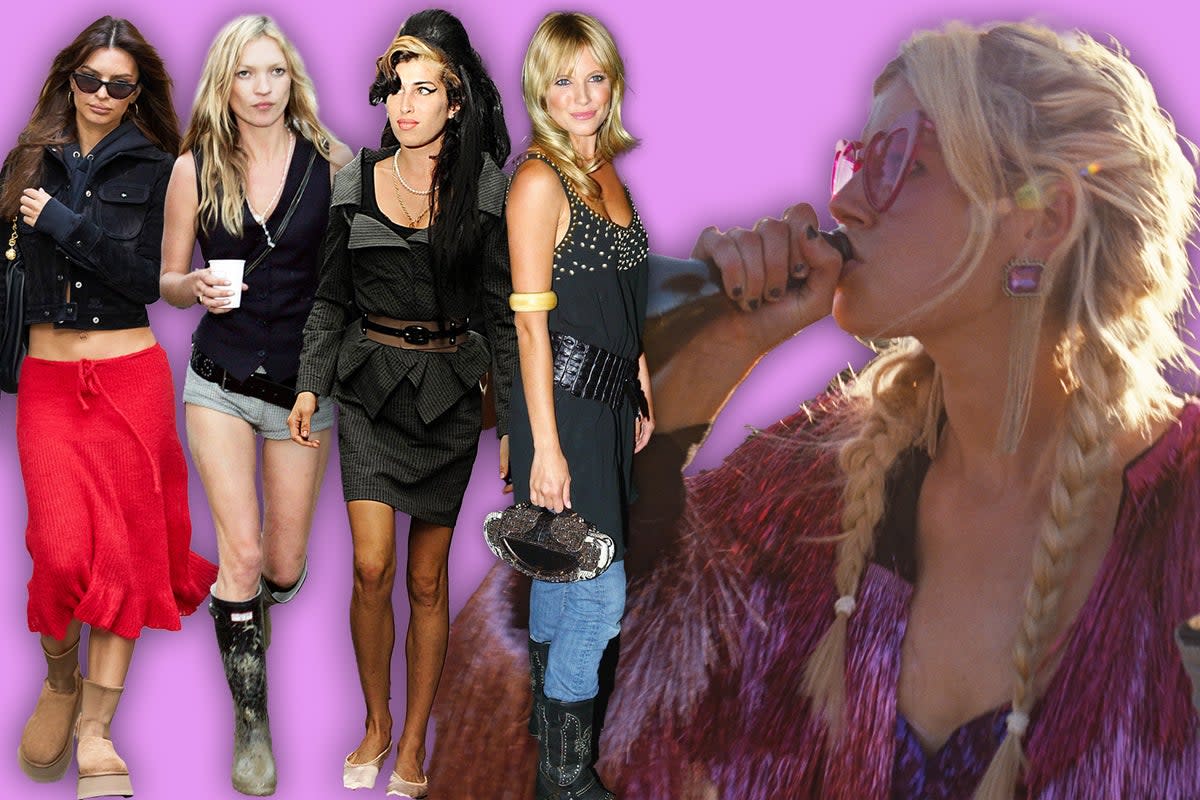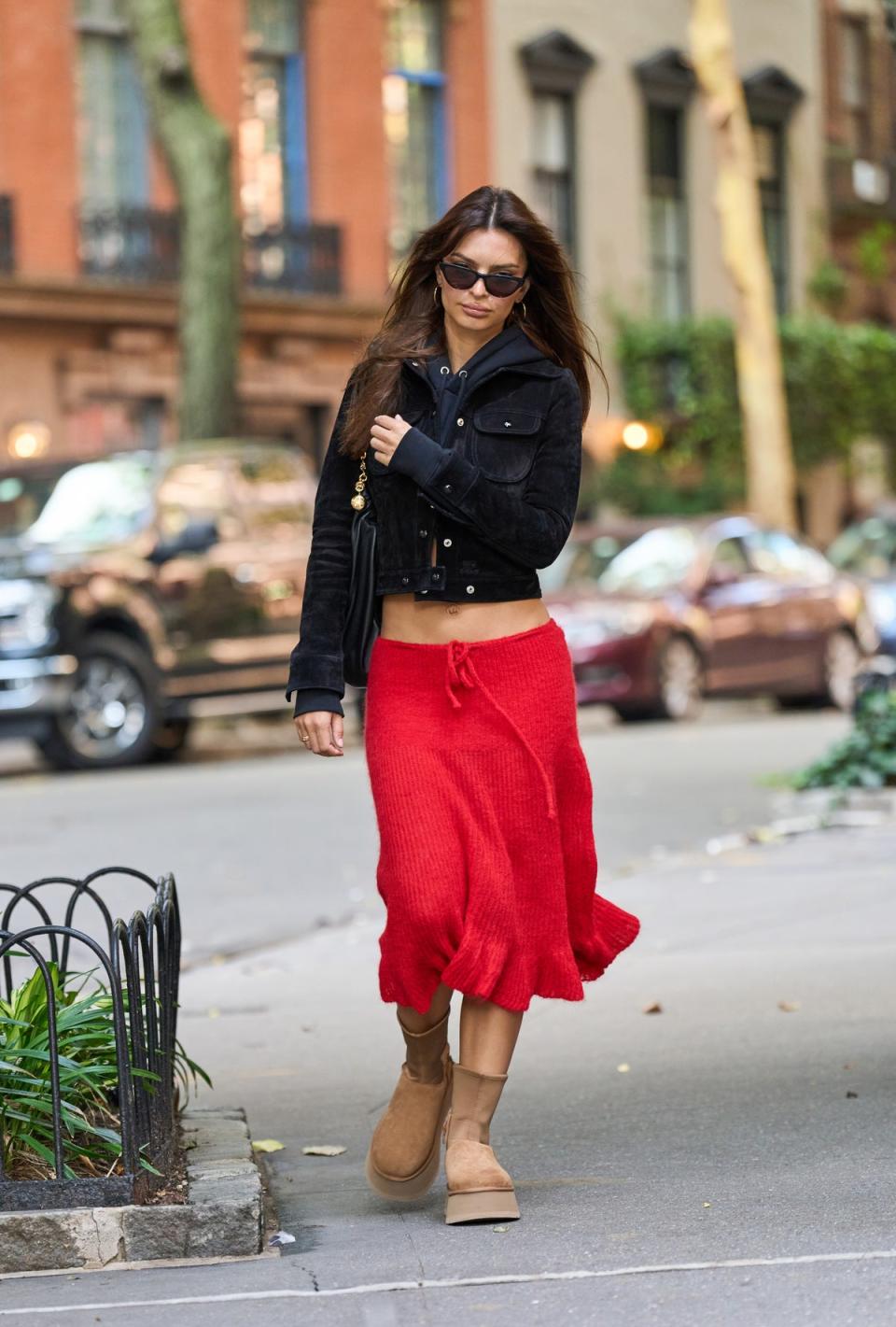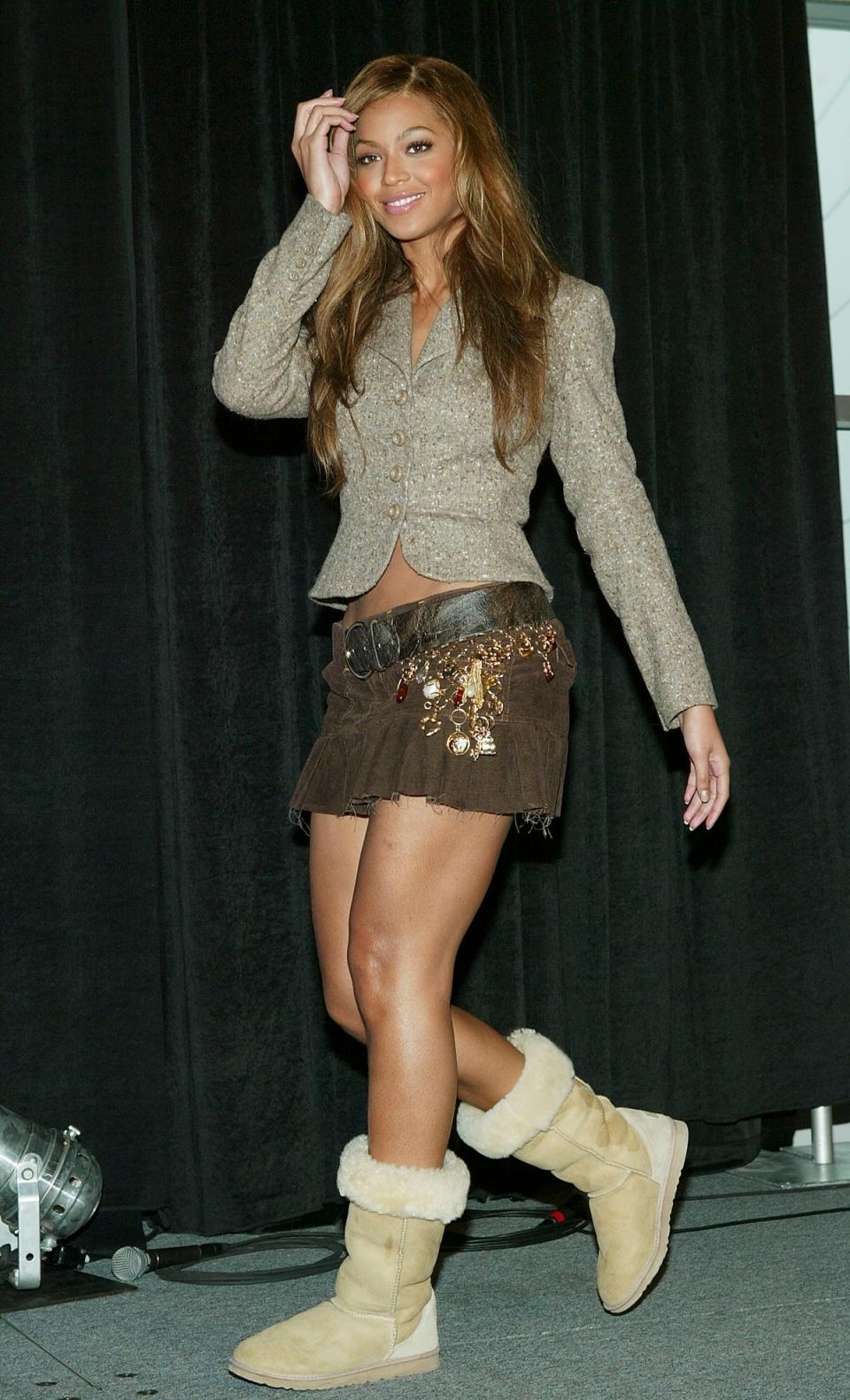Uggs, gilets and disco pants: Noughties fashion is back from the dead and it’s haunting me with a vengeance

Every so often, when I’m in the grips of extreme procrastination, I scroll back through the old photo albums on my near-dormant Facebook account. Their titles are a mix of forgotten teenage in-jokes and once-beloved song lyrics (no doubt a hangover from the Myspace era, before Zuckerberg). The pictures, captured on the digital camera that accompanied me on every night out, look a little fuzzy now, compared to the ultra-high resolution of an iPhone. But they’re still sharp enough that you can make out all the hallmarks of Noughties fashion in every group shot.
There are battered pairs of ballet flats. String upon string of fake pearls. Slouchy off-brand Ugg boots. Hi-shine, high-waisted disco pants, reflecting back the flash of my Canon. More waistbelts than the average episode of Gok’s Fashion Fix. I can practically smell the frazzled scent of burning hair, straightened to a crisp. All very nostalgic, all very cringe, all now thankfully relegated to the big Topshop in the sky. Or so I’d naively thought. Fashion’s relentless trend cycle comes for us all in the end and this year, it seems, the nostalgia pendulum has come to rest somewhere around 2007.
Bella Hadid and Emily Ratajkowski have been papped strolling through New York City in beige Uggs. A waistcoat is acceptable – even chic on a night out – no longer the sole sartorial preserve of Steve Arnott from Line of Duty. Its more practical cousin, the gilet, is also back, ready and waiting to keep your torso warm and your arms cold. Kylie Jenner is wearing disco pants, paired with going-out tops of indeterminate length. Most triggering of all? The discovery that beloved Scandi brand Ganni is now selling a high-fashion version of the sole-destroying ballet flats that teenage me wore until they fell apart (typically after about two months of continuous use).

It was inevitable that the trends of my adolescence would get re-tooled for a new generation somewhere down the line – that’s just how fashion works. But I certainly wasn’t expecting it to happen quite so quickly, or to induce such a stomach-flipping sense of vertigo. It’s only been exacerbated by a clutch of that era’s cultural figures re-entering the public consciousness. Pete(r) Doherty, once the poet laureate of try-hard indie teens, is cropping up everywhere (“ARE YOU WATCHING PETE AND LOUIS THEROUX????” my lifelong best friend urgently WhatsApped me the other night, reminding me of my teenage Libertines obsession). Waistbelt-wearing, bodycon-loving pop legends Girls Aloud may or may not be reuniting (please make it so!) and, erm, Call-Me-Dave Cameron is making a return to frontline politics. It’s enough to make you feel like a portal to the past has somehow opened up, Doctor Who-style (naturally David Tennant, who played the Doctor in the latter half of the Noughties, is reprising that role later this year).
Noughties fashion is having a moment on screen, too. Emerald Fennell’s new film Saltburn stars Barry Keoghan as Oliver, a working-class student at Oxford who is befriended by the aristocratic Felix, played by Jacob Elordi; Felix later invites his new pal to spend the summer at his family pile. It takes place between 2006 and 2007, and these fictional freshers dress in authentic period finery: the three “Js” – Jane Norman, Juicy Couture and Jack Wills – superfluous beaded necklaces and daffodil yellow LiveStrong charity wristbands. The latter, of course, were a rubbery tribute to now-disgraced cyclist Lance Armstrong, which, for some unfathomable reason, became a must-have. When they sold out online, we’d go to bizarre lengths to source one. I distinctly remember sending an envelope covered in first-class stamps to a friend of a friend of a friend, then receiving a rubbery bracelet in the post about a month later. I had only a vague idea of exactly who Armstrong was, really, but I liked the pop of colour against my white “Make Poverty History” band.
To nail this very specific period look, Saltburn costume designer Sophie Canale made “mood boards mainly of my friends drunk on Facebook as inspiration”, she recently told Women’s Wear Daily. She sounds like a woman after my own heart. And just like my friends and I, Fennell’s characters love a good pair of Uggs – or at least, Ugg-adjacent copycats. So devoted was I to my tan knock-off versions that 16-year-old me carried on wearing them almost immediately after undergoing a knee arthroscopy (fake Uggs and crutches – a real fashion statement).
My physiotherapist was horrified – and for good reason. In 2010, the British College of Osteopathic Medicine put out a statement imploring teenage girls like me to ditch their poorly-made imitation boots, warning that the lack of foot support could eventually lead to wear and tear on the ankles, knees and hips. “Just because something becomes a trend or fashionable doesn’t mean it’s good or right,” the organisation’s then-head Dr Ian Drysdale warned. Wise words indeed – but if I’d heard them at the time, I’d probably have rolled my eyes and gone back to trying to find the perfect footless tights to pair with my fleecy shoes. Ballet flats, with their similar absence of support, were pretty terrible for your podiatric health too, but it was a sacrifice we were willing to make in order to look a bit like Kate Moss. Looking good could be painful: after attending one friend’s 16th birthday meal, I had to go home and lie down in agony thanks to waist belt-induced indigestion.

Of course, Mossy, the patron saint of Noughties style, was on Canale’s radar when it came to dressing Saltburn’s students. The costume designer tracked down styles from the model’s first fashion collection for Topshop, which would have been seriously hot property around the period in which the film is set. More than 15 years on, I still have near-perfect recall of almost every piece, because I wanted them so much: the silvery halter-neck gown, the red skinny jeans, the patterned shorts crying out to be layered over a pair of 60 denier opaque tights. I’m pretty sure those designs are probably seared onto my poor, long-suffering mum’s memory, too. Like some sort of mini Miranda Priestly, I sent her trawling round all the Topshops in the Liverpool City Region to try and find the sell-out pansy print tea dress from Kate’s line. Why didn’t I do it myself? Too busy stomping around Snowdonia, attempting to get a bronze Duke of Edinburgh award, having been gaslighted into believing that this would prompt paroxysms of admiration from university admissions staff.
She never did find the dress, but I managed to get hold of one years later, when Moss re-released some of her greatest hits to mark her final Topshop collection. It shrunk to unwearable dimensions after a few washes, but I still have it hanging in my wardrobe like a tiny floral trophy.
Perhaps one day I’ll sell it on Vinted to a Gen-Zer who can’t remember the Noughties but likes the retro aesthetic (I’d have to label it “worn, with minor fake tan stains”, though). But most likely I’ll keep hold of it. The clothes we wear when we don’t quite know who we are or what we’re doing with our lives are a bit cringeworthy, yes, but they’re also strangely endearing. Much as the rational part of my brain might be horrified by its baffling silhouettes and bizarre accessories, I’ll always have a soft spot for Noughties fashion – just don’t expect to see me in a waistcoat any time soon.


